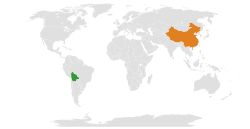Top Qs
Timeline
Chat
Perspective
Bolivia–China relations
Bilateral relations From Wikipedia, the free encyclopedia
Remove ads
Bolivia–China relations are foreign relations between the Plurinational State of Bolivia and People's Republic of China. Relations between both nations officially began on July 9, 1985.[1][2] Both nations are members of the United Nations.
History
Since the establishment of diplomatic ties between China and Bolivia in 1985, relations have expanded from economic and cultural ties to military, transport, infrastructure, raw materials, education and other areas.[3]
The two countries celebrated 25th anniversary of diplomatic ties in Beijing, July 9, 2010.[4]
In August 2010, China and Bolivia agreed to continue to develop military ties and cooperation.[5]
Remove ads
Bilateral relations
Bilateral trade began from very low volumes at approximately $4 million.[2] This increase to over $27.76 million in 2002.[2]
China's exports to Bolivia includes hardware, machinery, light industrial goods, textiles and daily necessities.[2]
Bolivian exports to China were lumber and mineral ore.[2]
China provided support for the establishment of the Bolivian Space Agency and the launch of its first satellite in 2014 for a total cost of US$300 million. China and also provides loans, e.g. of 67 million dollars to upgrade infrastructure in the Oruro region.[6]
A Chinese firm is a partner in a lithium mining operation in Bolivia valued at $2.3 billion.[7]
In July 2019, UN ambassadors of 37 countries, including Bolivia, signed a joint letter to the United Nations Human Rights Council defending China's persecution of Uyghurs in Xinjiang.[8][9] Bolivia was one of 16 countries that defended China's policies in Xinjiang in 2019 but did not do so in 2020.[10]
In June 2023, Bolivia turned to China for assistance amid the former's first economic crisis since the early 2000s.[11]
In February 2024, Bolivia obtained a $350 million loan from China to build a zinc refining factory.[12]
Remove ads
Surveillance systems
In 2019, China developed the purpose of overhauling the Bolivian security system worth more than 105 million dollars. This system comprises new surveillance cameras, drones, automated evidence processing systems, and increased manpower to manage each of these new technologies, which have been collectively dubbed the BOL 110.[13] The Bolivian Government said BOL 110 implementing artificial intelligence to counter crime. Some individuals have expressed concern about the nature and the pervasiveness of these technologies, however, and how they may be used to create a Bolivian police state. The recent employment of dubious surveillance and manipulation tactics by the Bolivian government may validate these concerns, with some scholars going so far as to warn that similar systems can encourage authoritarian practices.[13]
Resident diplomatic missions
- Bolivia has an embassy in Beijing.[14]
- China has an embassy in La Paz and a consulate-general in Santa Cruz de la Sierra.[15]
See also
Bibliography
- Cardenal, Juan Pablo; Araújo, Heriberto (2011). La silenciosa conquista china (in Spanish). Barcelona: Crítica. p. 279. ISBN 9788498922578.
References
External links
Wikiwand - on
Seamless Wikipedia browsing. On steroids.
Remove ads

